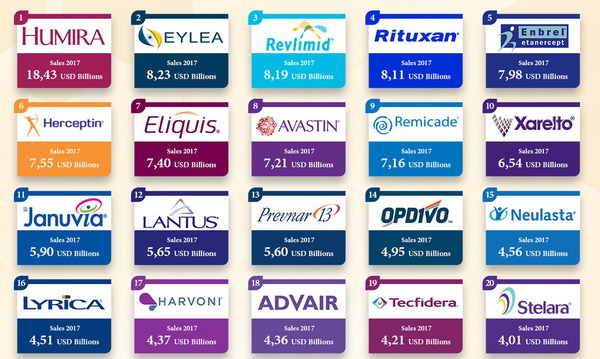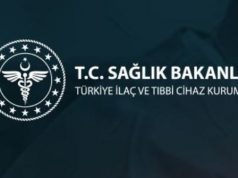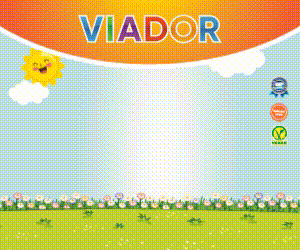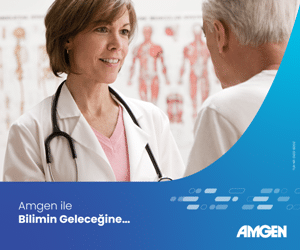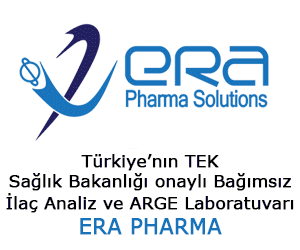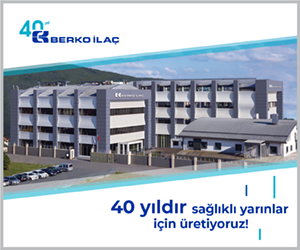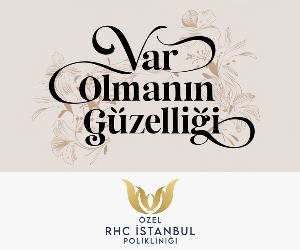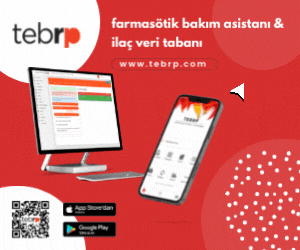2017 yılında, küresel reçeteli ilaç piyasasının% 0.8 oranında büyüyerek 810 Milyar ABD Doları’na ulaşacağı tahmin edilmektedir ve ayrıca 2018’den 2022’ye kadar% 6’lık CAGR’da 2022 yılına kadar yaklaşık 1.05 trilyon USD‘ye ulaşması beklenmektedir.
En çok satan ilk 20 ilaç toplam gelir 135 milyar ABD dolarıydı ve 2017 yılında küresel reçeteli ilaç pazarının toplam% 16,65’ini oluşturuyor. İlk 20 ilaç 15 şirket tarafından üretiliyor.
İlk 20 listesindeki ilaçların tedavi grupları:
kanser, diyabet, anti-enflamatuar,HIV veya HCV enfeksiyonlarının tedavisi….
- Humira (Adalimumab): Humira tops the global prescription-drug list of 2017 and achieved annual revenue growth of 14.6% to reach global revenue of USD 18.43 billion in 2017. Humira is manufactured by AbbVie Inc. (U.S.). It is indicated in the treatment of autoimmune diseases and moderate to severe active rheumatoid arthritis. The patent is expired in 2016 in the U.S. and will expire by 2018 in Europe creating competitive opportunities for biosimilars product.
- Eylea (Aflibercept): Eylea ranks second in the global prescription-drug list of 2017 and achieved annual revenue growth of 62.97% to reach global revenue of USD 8.23 billion in 2017. It is produced by Bayer (Germany) and Regeneron Pharmaceuticals (U.S.). It was approved by the U.S. Food and Drug Administration (FDA) for use in retinal indications, and continues to be the market-leading brand in anti-VEGF therapy segment in the United States.
- Revlimid (Lenalidomide): Revlimid ranks third in the global prescription-drug list of 2017 and achieved annual revenue growth of 17.50% to reach global revenue of USD 8.19 billion in 2017. Revlimid is produced by Celgene (U.S.). It is indicated in the treatment of multiple myloma and patent is set to expire in 2027, which makes it an extremely important product in the company’s portfolio.
- Rituxan (Rituximab, MabThera): Rituxan currently holds 4th position in the global prescription drug market due to high revenues amounting to USD 8.11 billion and the revenue declined by nearly 5.47 % in 2017. Biogen and Roche co-markets the product indicated in the treatment of cancer. The patent for this product expired in 2015 which resulted in significant decrease in sales.
- Enbrel (Etanercept): Enbrel annual revenue declined by 10.03% to reach global revenue of USD 7.98 billion in 2017. It is co-marketed by Amgen Inc. in the U.S. and Pfizer Inc. in Europe. Pfizer also has a co-promotion agreement with Takeda Pharmaceutical Company Ltd. to market Enbrel in Japan. It is another drug indicated for autoimmune diseases including rheumatoid arthritis, psoriasis and other inflammatory conditions.
- Herceptin (Trastuzumab): Herceptin sales were up by 15.98%, to reach global revenue of USD 7.55 billion in 2017. Revenue growth is helped by additional reimbursement approvals in China and continued growth in the US due to longer duration of treatment in combination with Perjeta. Herceptin is another product manufactured by Roche, and is primarily used in treatment of breast and gastric cancer.
- Eliquis (Apixaban): Eliquis has become a leading anticoagulant with sales grown up by whooping 121.55%, to reach global revenue of USD 7.4 billion in 2017. Revenue growth is attributed to higher demand given its increased acceptance and faster market share gains. It is produced by Bristol-Myers Squibb (U.S.) and Pfizer (U.S.), and is primarily used in treatment of atrial fibrillation and Deep Vein Thrombosis (DVT).
- Avastin (Bevacizumab): Avastin global sales grown by 10.75% in the 2017 to reach revenue of USD 7.21 billion. Sales continued to grow strongly in global market, especially in China, after drug received the approval for the lung cancer indication. Avastin is manufactured by Roche and is primarily used for treating advanced colorectal, breast, lung, kidney, cervical and ovarian cancer, and relapsed glioblastoma.
- Remicade (Infliximab): Remicade sales declined by 8.55% to reach global revenue of USD 7.16 billion in 2017. Product is losing the revenue since February 2015, as it lost market exclusivity in major European markets and in other marketing territories. The product is experiencing pricing and volume declines as a result of biosimilars competition. It is indicated for autoimmune diseases and produced by Johnson & Johnson (U.S.) and Merck & Co. (U.S.).
- Xarelto (Rivaroxaban): Xarelto has achieved growth rate of around 21.33% to reach revenue of USD 6.54 billion in 2017. This anti-coagulant was manufactured by Bayer (Germany) and Johnson & Johnson (U.S.). It aids in the reduction of the risk of stroke and systemic embolism in patients with nonvalvular atrial fibrillation; deep vein thrombosis (DVT) and pulmonary embolism (PE), and reduction in the risk of recurrence of DVT and of PE.
- Januvia/Janumet (Sitagliptin): Worldwide sales of Januvia/Janumet were declined by 3.43% and reached USD 5.90 billion in 2017. It is used for the treatment of type 2 diabetes. The sales decline was driven primarily by pricing pressures in the United States and Europe despite higher volumes in the United States, Europe and Canada. Merck & Co. (U.S.) manufactures the product.
- Lantus (Insulin glargine): Lantus generated revenues of USD 5.65 billion in 2017, a decline of 6.61% from the previous year. Lantus, a longer-lasting insulin analogue is produced by Sanofi (France). The U.S. patent for the product expired in August 2014, since then the product is losing market share to biosimilars. It was once one of the top-selling diabetes products in the world.
- Prevnar 13/ Prevener (Pneumococcal 13-valent Conjugate Vaccine): Prevnar 13/ Prevener generated revenues of USD 5.6 billion in 2017, a decline of 2.14% from the previous year. The drug is manifactured by Pfizer (U.S.).
- Opdivo (Nivolumab): Opdivo has achieved growth rate of around 31.29% to reach revenue of USD 4.95 billion in 2017. It represents the major part of Bristol-Myers Squibb’s immune-oncology portfolio. It is a fully human monoclonal antibody that has been approved and continues to be used as an anti-cancer treatment. U.S. and international revenues increased due to higher demand resulting from the rapid commercial acceptance for several indications including melanoma, head and neck, lung, kidney and blood cancer.
- Neulasta/ Peglasta and Neupogen / Gran (Pegfilgrastim and Filgrastim): Neulasta generated revenues of USD 4.56 billion in 2017, a decline of 2.97% from the previous year. It is a recombinant human granulocyte-colony stimulating factor (G-CSF) manufactured by Amgen (U.S.) and Kyowa Hakko Kirin (Japan). It is used to decrease the incidence of infection during cancer treatment. The U.S. patent for the product expired in June 2015.
- Lyrica (Pregabalin): Lyrica generated revenues of USD 4.51 billion in 2017, a decline of 9.25% from the previous year. It is an anti-epileptic from Pfizer Inc. The patent for Lyrica is set to expire in 2018. It is mostly used in neuropathic pain associated with diabetic peripheral neuropathy; postherpetic neuralgia; fibromyalgia; and pain associated with spinal cord injury.
- Harvoni (Ledipasvir/sofosbuvir): Harvoni generated revenues of USD 4.37 billion in 2017, a huge decline of 51.87% from the previous year. This product from Gilead Sciences is indicated in treatment of HCV/HIV infection. Wide patent range till 2030 will aid the company’s overall growth which may be partially offset by the declining growth since last three years.
- Advair /Seretide (Fluticasone and Salmeterol): Advair has achieved growth rate of around 0.69% to reach revenue of USD 4.36 billion in 2017. Advair is manufactured by GlaxoSmithKline (U.K.) and indicated in treatment of asthma and maintenance treatment of COPD. The sales are expected to decline further as drug U.S. patent expired in 2016.
- Tecfidera (Dimethyl fumarate): Tecfidera has achieved growth rate of around 6.04% to reach revenue of USD 4.21 billion in 2017. It is manufactured by Biogen (U.S.). This drug is used for treating multiple sclerosis. The product consistently showing a revenue growth since last 2 years, primarily due to price increases and higher sales volume in U.S. and expansion of the product launch in emerging markets across the globe.
- Stelara (Ustekinumab): Stelara has achieved growth rate of around 24.14% to reach revenue of USD 4.01 billion in 2017. It is manufactured by Johnson & Johnson (U.S.). This drug is used for treating Plaque psoriasis. The product has been consistently showing a revenue growth for the last 2 years, primarily due to price increases and higher sales volume in U.S. and expansion of the product launch in emerging markets across the globe.
Sources: SEC filings, companies websites, and annual reports.


